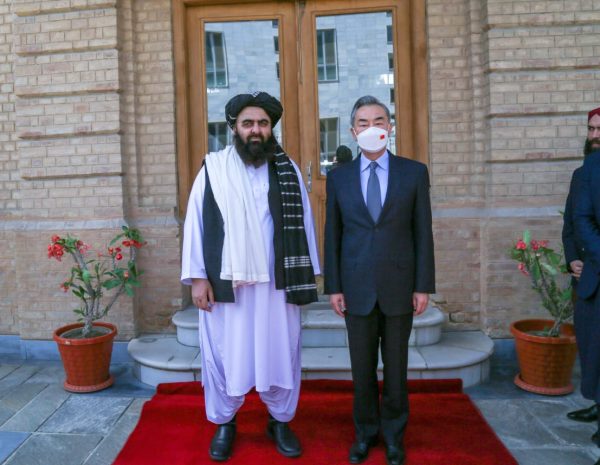
Wang Yi’s visit marked one of the highest-level engagements for the Taliban regime – and came just a day after the Taliban broke a promise to allow older girls to attend school.
China’s foreign minister made a surprise stop on Thursday in Afghanistan’s capital to meet with the country’s new Taliban rulers — even as the international community fumes over the former insurgents’ broken promise to reopen schools to girls beyond the sixth grade.
The official Bakhtar News Agency announced that Wang Yi will meet with Taliban leaders “to discuss various issues, including the extension of political relations, economic, and transit cooperation.”
The Taliban, who seized power in August 2021 during the last, chaotic weeks of the withdrawal of U.S. and NATO forces from Afghanistan after 20 years of war, have been seeking international recognition in order to open up the country’s economy, which has been in free fall since their takeover.
China has not shown any inclination to recognize the Taliban government but has avoided criticizing the new rulers despite their repressive rules directed particularly at women, who are denied the right to work and full access to education.
Diplomat Brief Weekly Newsletter N Get briefed on the story of the week, and developing stories to watch across the Asia-Pacific. Get the Newsletter
On Wednesday, the Taliban unexpectedly reversed plans to reopen schools in Afghanistan to girls above the sixth grade, reneging on their promise in a move apparently meant to appease their hardline base at the expense of further alienating the international community.
Enjoying this article? Click here to subscribe for full access. Just $5 a month.
China has also kept its embassy in Kabul open and has offered limited emergency assistance.
The U.S.-led coalition unseated the Taliban in 2001 after they refused to hand over al-Qaida leader Osama bin Laden after the 9/11 terrorist attacks in America. The Taliban returned to power in mid-August and installed an all-male, Taliban-only administration. The international community has been urging them to open up the government to ethnic minorities and women.
Wang is one of the highest-level visitors to Afghanistan since the Taliban takeover. China has economic and mining interests in Afghanistan and Afghans familiar with past talks between the Taliban and Chinese officials say Beijing wants Taliban commitments to prevent Uyghur militants from setting up operations in Afghanistan.
Last July, before the Taliban seized power, Wang hosted a senior Taliban delegation with their top leader, Abdul Ghani Baradar, in the Chinese city of Tianjin. At that meeting, Wang sought assurances the Taliban would not allow anti-China groups to operate under their rule and referred to the Taliban as “a pivotal military and political force in Afghanistan.”
There have been reports that militants from among the Turkic Muslim Uyghur minority native to China’s northwestern region of Xinjiang have found shelter in Afghanistan. China has carried out a campaign of repression against Uyghurs and other Muslim minorities, including locking a million or more away in political re-education camps.
The overseas East Turkestan Islamic Movement has for years fought a low-level insurgency against Chinese rule. It has been aligned with the Islamic State group’s affiliate in Afghanistan — known as the Islamic State in Khorasan Province — an enemy of the Taliban. Following the Taliban takeover, reports indicated that Uyghur fighters were being moved away from Afghanistan’s narrow border with China, although the U.N. has found “no recent signs” that the Taliban is actively seeking “to limit the activities of foreign terrorist fighters.”
Despite consistent and documented reports of Beijing’s crackdown on the Uyghurs, Wang was welcomed as a special guest in Pakistan earlier this week, at a summit of foreign ministers from the member states of the Organization of Islamic Cooperation.
At the summit, Wang called for negotiations to end the war in Ukraine. None of the OIC participants or host Pakistan, which has been particularly vocal about growing Islamophobia, mentioned China’s crackdown on its minority Muslims, including the destruction of mosques and punishment for those Uyghurs who participate in religious edicts.
China also has an interest in a stable Afghanistan as it has been used as a base for insurgent attacks against Chinese nationals in neighboring Pakistan. China has invested billions of dollars in the China-Pakistan Economic Corridor, a transit and trade project linking the Arabian Sea Port of Gwadar in Pakistan with China in the northwest. Pakistan has complained that militant groups – including those targeting CPEC projects – are finding shelter in Afghanistan, where the Taliban’s leadership is reluctant to turn against former allies.







